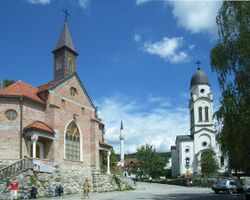Religion:Multiconfessionalism
Multiconfessional countries have a power sharing arrangement between people of different faiths, usually three or more significant confessional groups within the same jurisdiction. Examples of modern countries deemed multiconfessional are Lebanon,[1][2] Bosnia and Herzegovina and Albania.[3]
The "National Pact" in Lebanon is a formal agreement altering the 1926 Constitution, which laid the foundation of Lebanon as a confessionalist state. Instead of a minority wielding the most power, political power became more representative.[4]
Since the end of the Ottoman era, Bosnia and Herzegovina and Albania have been the most multiconfessional countries of Europe.
The 3 dominant religions of Bosnia and Herzegovina (Islam, Eastern Orthodox Church, Roman Catholic Church) are practiced by the three native ethnic groups of the country: Bosniaks, Bosnian Serbs and Bosnian Croats respectively. Religious nationalism that emerged as part of the breakup of Yugoslavia would later cause the Bosnian War.
Albania has 4 dominant religions: Islam, Eastern Orthodox Church, Roman Catholic Church and Bektashism, because of the geographical position conquest by the Roman Empire, Byzantine Empire and the Ottoman Empire, but the country has declared itself as a very secular state. During the communist era, Albania declared itself as the first atheist country in the World. The ethnic Albanians living inside or outside the Balkans have one of the most religious diversities in the World.
Kosovo, even though about 95% Muslim, has a significant Albanian catholic population (more than 5%) with their center being Gjakova.
Confessionalism
See also
- Religions by country
- Multiculturalism
- Religious pluralism
References
- ↑ Dawahare 1998.
- ↑ Sjur Bergan; Hilligje van't Land (2010). Speaking Across Borders: The Role of Higher Education in Furthering Intercultural Dialogue. Council of Europe. pp. 167–. ISBN 978-92-871-6941-9. https://books.google.com/books?id=cSq7GN3ZwGQC&pg=PA167.
- ↑ Mary McIntosh; Dan Abele; University of Strathclyde. Centre for the Study of Public Policy (1996). Tolerance for a multiethnic Bosnia-Hercegovina: testing alternative theories. Centre for the Study of Public Policy, University of Strathclyde. https://books.google.com/books?id=V6QtAQAAIAAJ.
- ↑ R. Rabil (12 September 2011). Religion, National Identity, and Confessional Politics in Lebanon: The Challenge of Islamism. Palgrave Macmillan US. ISBN 978-0-230-33925-5. https://books.google.com/books?id=3fHMCwAAQBAJ.
Further reading
- Thomas Max Safley (9 June 2011). A Companion to Multiconfessionalism in the Early Modern World. BRILL. ISBN 978-90-04-20697-7. https://books.google.com/books?id=EI6bX73eAXgC.
- Dawahare, Michael D. (1998). Multiconfessionalism, Asabiya, and Civil Society in Lebanon: Toward a Hermeneutic Theory of the Public Sphere in Comparative Studies. University of Kentucky. https://books.google.com/books?id=96lAOAAACAAJ.
 |


